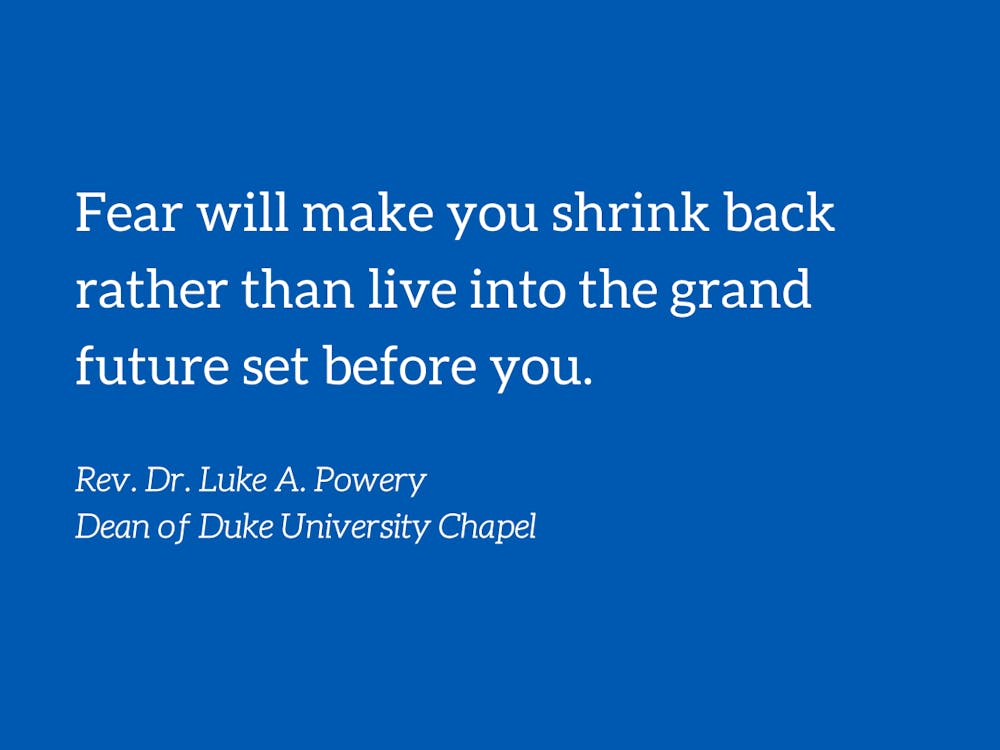As we approach the end of this semester and imagine our short-term or long-term futures, it’s important that we confront the F-word. I mean the really bad F-word—fear.
Poet Emily Dickinson struggled with fear and lived most of her life in isolation. This sulky poet of sorrows may seem like a downer because her poetry is not an ode to joy but more like an ode to truth. Sometimes the truth is captured in her words like this, “I lived on dread.” Dickinson understood her mortality in such a way that she penned other lines such as: “Because I could not stop for Death–He kindly stopped for me” and then one of the most haunting lines I’ve ever read: “I felt a funeral, in my brain.” She realized fear’s impact on her life.
Dickinson fits right in with a story about three servants in the Gospel of Matthew (Matthew 25:14-30). In this parable, a master gives money to three servants and then goes away. Two of the servants multiply the money through trade while the third hides away the money entrusted to him. When the master returns, he rewards the first two servants for their investing and condemns the third. So much is made of the first two servants. You could say they are the ones who get the prized jobs in Silicon Valley. But I feel sorry for, and am drawn to, the third servant, the one with the least. He’s the underdog. No profit, no party, no pat on the back from his master.
This third servant explains why he has only the sum of money he was originally given, saying: “Master, I knew that you are a hard man. You harvest grain where you haven’t sown. You gather crops where you haven’t spread seed. So I was afraid. And I hid my valuable coin in the ground.” In so many words, he is saying, “I was afraid and I hid.”
Fear can paralyze us, making us inactive and stagnant, keeping life at a standstill, no matter how well we’re doing at Duke. Fear can prevent us from making tough decisions or cause us to avoid certain people, places, or things. With fear, no one will take risks and without risks, there will be no growth.
Fear can consume you. In 1819, the whaleship Essex, which is the basis for Herman Melville’s Moby Dick, set sail from Nantucket Island for a routine voyage; it would eventually be anything but routine. There were 20 American sailors on the ship. In 1820, the ship was 3,000 miles off the coast of Chile in South America when it was struck by a sperm whale that made a hole in the hull of the ship. The ship began to flood with seawater so the men got into three small whaleboats as their ship sunk. They were about 1,200 miles from the closest island to the west. Some of the sailors wanted to go there but others didn’t, because they feared that cannibals lived on those islands, which was a prevalent rumor in that day. They decided not to go to the closest island and headed in another direction, even with their limited supplies of food and water. Fear led them in another direction. Eventually, due to lack of food and water, some sailors began to die. And what happened? Ironically, the sailors end up doing the same thing they feared—eating one another.
Fear will consume you, and if you feast on it, you will die even while you live. You’ll die young. You’ll die with your eyes wide open. You’ll die with your dreams. This isn’t just a funeral in your brain; your whole life will become a funeral procession because you’ll be a dead man or woman walking, which is one of the greatest tragedies of our mortal life.
Now, don’t misunderstand me: There are real dangers of which we should be afraid. Fear can prevent you from touching a fire with a bare hand. It can prevent you from opening up the airplane door when you are 30,000 feet in the air. It can prevent you from walking in the middle of a busy highway. Fear may be a hardwired biological version of common sense. Fear, in the business world, can be viewed as “productive paranoia,” according to writer Karen Thompson Walker. It can be constructive and this is a good thing.
However, when fear destroys a life’s purpose and potential, it’s a tragedy. This is the lesson I take from the parable of the three servants. The third servant buried the wrong thing. He should have buried fear. If we succumb to our fears, we won’t do the things we need to do nor go where we need to go. We end up saying with the servant, “I was afraid and I hid.”
So as we approach the end of this academic year, I encourage you to face your fear and bury it. Fear will make you shrink back rather than live into the grand future set before you. Fear will make you smaller than who you are. Let this be the day that fear is finished in your life. Bury it and don’t ever dig it up again.
Rev. Dr. Luke A. Powery is the Dean of Duke University Chapel. His column runs on alternate Mondays.
Want to respond to this opinion piece or submit one of your own? Visit this page for information on guest columns and letters to the editor.
Get The Chronicle straight to your inbox
Signup for our weekly newsletter. Cancel at any time.

